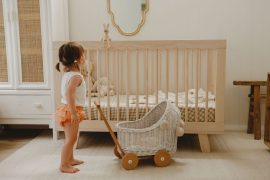So what about Catherine?
If you get there as the tug of war is going on, while you ensure no-one is hurt, you can turn the problem over to them. What you won’t do is sort it for them. If you take the ball from Catherine to give it back to Martin because “he had it first”, you have just ‘done a Catherine’ yourself. How will they make sense of this when it doesn’t make sense? However, if you calmly get in there alongside the toddlers, turn your hands palms up and offer, “I see you both want the same thing. What can we do?”, toddlers will stop, look at you and most often sort it out themselves. If, after a wait period, that doesn’t do it, you could offer a similar toy: “Here is another ball. Would you like this one? You can also support the child who gives up too easily by giving permission for him to hold on if he wants to keep a toy, “Hold on if you want to keep the ball Martin.” Assertiveness is a virtue too.
Keeping them safe
There is a real balancing act for adults when children are growing and discovering together. Our first consideration is to keep babies and children safe from hurting each other. That is done firmly and kindly without blame, shame, or name-calling. When we have made sure each child is safe, our role is to support them in their present situation, and the kind of support they want from us is not what we have done traditionally.
If the child is upset, you need to acknowledge his feelings because he will be awash with emotion, and you can help him make sense of that.
Toddlers learn by doing
When conflict arises between children, it offers the perfect learning-time for both children: it is the perfect situation for them to learn to solve problems peacefully. But – and it is a big but – whether they do or not will depend on you. Many adults and teachers get in there not to support the children, but to solve the conflict for them. That is such a waste of a fine learning situation, with two very big downsides:
- If adults always solve their conflicts and problems for them, they will always look to adults to solve their conflicts and problems for them.
- Worse, by fixing things for them (because we feel uncomfortable with conflict) we are robbing them of learning one of the most important skills they need if they are going to live happy lives – how to sort out their own stuff.
You are the model they will mirror
When you offer respectful support to toddlers and young children in conflict, you will be surprised how quickly they become skillful in finding solutions for their own issues.
Gently does it
Children will be as gentle with each other as they have been treated themselves, yet still children pull hair, mouth (bite), and hurt others. Firstly, this must be stopped straight away, firmly and gently, but it is important for adults to realise that this hurting is not done with malice. This is the infant learning about this amazing world they have landed in. There is a lot to learn and it takes an infant a long, long time to learn that getting handfuls of that interesting stuff called hair hurts and causes another child to cry. We can help that process of them working out cause and effect by gently telling them: “When you pull hair it hurts, Jason.” It is enough to put your hand between the child wanting to explore hair and the hair while saying. “I can’t let you pull Jason’s hair. It hurts him.”
Be nice, you’ve got to be patient
Children will share as soon as they have the all the learnings in place that make sharing possible. If you understand what they have to learn and support them as they are doing it they will get there with elegance. Children supported in this way astound adults with their mature and peaceful play.
Pennie Brownlee is a teacher, facilitator, mother, grandmother, author, book publisher and creator of the Facebook page Dance with me in the Heart – a site for parents and early childhood teachers of young children. It focuses on heart-centred partnerships with babies, children, adults, and the earth. Check out http://penniebrownlee.weebly.com/ and goodeggbooks.co.nz










